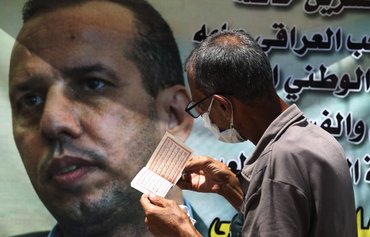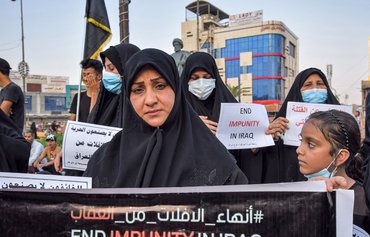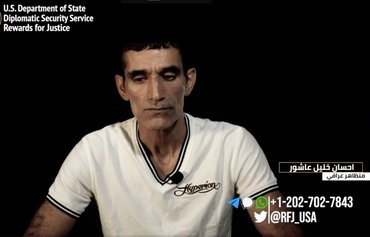Iraqi armed groups backed by the Islamic Revolutionary Guard Corps (IRGC) and led by Kataib Hizbullah are carrying out assassinations to silence and intimidate Iraqis opposing their agenda, observers told Diyaruna.
Over the past year, dozens of activists have been killed by "unidentified gunmen" amid popular protests against corruption, poor government services and foreign interference in Iraq's internal affairs -- particularly by Iran.
The most recent assassination occurred on November 1st, when unidentified gunmen killed Abdul Nasser al-Tarfi al-Taie, a tribal leader, in front of his house in al-Amara, southern Iraq.
Al-Taie was known as a major supporter of demonstrations and a harsh critic of IRGC proxies in Iraq.
![Iraqis gather in Baghdad on October 30th to mourn fellow protestors allegedly assassinated by IRGC-backed militia. [Photo circulated on social media]](/cnmi_di/images/2020/11/09/26878-Iraq-Baghdad-protest-600_384.jpg)
Iraqis gather in Baghdad on October 30th to mourn fellow protestors allegedly assassinated by IRGC-backed militia. [Photo circulated on social media]
Targeting journalists
Gunmen have targeted several activists and protestors in the past several months. Among those killed are Riham Yaaqub, Tahseen Usama al-Shahmani, Anwar Jassim Mahwous, Abdul Qaddous Qasim, Karar Adil, Fahim al-Taie and Raheem Sajit al-Muntafaji.
Also assassinated was prominent security analyst Hisham al-Hashemi who received threatening messages from Kataib Hizbullah before he was murdered.
The threats came after al-Hashemi's analyses pointed to the IRGC-affiliated militias' role in the attacks on Baghdad's Green Zone.
In the past year alone, 373 attacks on Iraqi journalists were recorded. Journalists Ahmed Abdel Samad and Safaa al-Ghali were murdered, some journalists received death threats and a number of them were kidnapped. Armed men also attacked the offices of a few Iraqi media outlets.
Many activists and journalists were forced to move for fear of being targeted.
Eliminating reformists
Military expert Ayad al-Tufan told Diyaruna "these assassinations are not limited to a specific party or faction; they intend to thwart and terrorise activists and minimise their role in reforming the country's politics."
He said video footage shows perpetrators are professional assassins with logistical support such as money, cars, weapons and devices to monitor their victims.
Hisham al-Hashemi's murder "is a clear example of that," he added.
Al-Tufan said IRGC proxies seek to spread terror and chaos in the country to ensure their continued control over Iraq's sovereignty, adding, "Every assassination is an explicit threat to other activists."
The Islamic Republic has a long history of human rights violations inside and outside Iran, which includes tracking and eliminating its opponents around the world. It has assassinated some 360 individuals in more than 40 countries since it came to power in 1979.
Sheikh Thaer al-Bayati, secretary general for the Arab Tribal Council in Salaheddine province, told Diyaruna the Iranian regime carries out assassinations through Kataib Hizbullah and ultimately aims to silence activist figures that it considers threatening to the IRGC influence and interests.
"IRGC officers train Kataib Hizbullah and other militia groups to kidnap and kill anti-Iran figures," he said.
"Assassination orders are issued by Iran in the form of lists," he said, noting that "their execution is undertaken by those loyalist groups whose involvement in these crimes is no longer a secret".
Al-Bayati said militia members' hostile acts are part of efforts intended to "undermine the rule of law, disrupt order and threaten well-known Iraqi figures who oppose Iran's regional hegemony".

![Tribal leader Abdul Nasser al-Tarfi al-Taie, a harsh critic of Iran and its proxies in Iraq, was assassinated by an armed group in front of his house in southern Iraq on November 1st. [Photo circulated on social media]](/cnmi_di/images/2020/11/09/26877-Iraq-militias-assassination-600_384.jpg)






